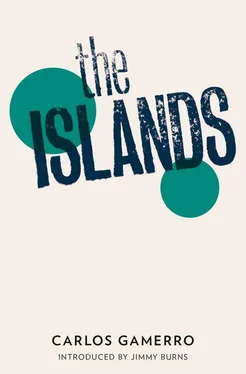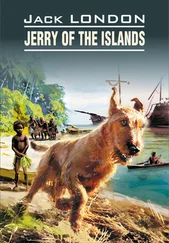‘Our Islands! Our beloved Islands! The Serpent that stretches the length of the Andes tried to lay its eggs on our shores, but they smashed on the hard surface of the ocean!’
‘What is he on about?’ I asked Ignacio.
‘He’s got this theory that at the start of ’82 the English were withdrawing from Malvinas so they could be populated by Chilean and Israeli settlers. The first stage of the Andinia Plan. They’d then invade us on two fronts. According to him, foiling the Andinia Plan meant we actually won the war.’
‘Wonders will never cease.’
‘Well … if you look at the map of Chile, it does actually look like a snake. Look, Tierra del Fuego’s the tail. It laid its eggs in the Atlantic after the Chileans took the Beagle Channel off us. And you’re not going to tell me the Islands don’t look like two splatted eggs.’
It sounded ridiculous, but it did have a certain logic to it. And it was more interesting than the dry theories of historians.
‘Two eggs, yes!’ exclaimed Citatorio, and everyone settled down for the juiciest part of his routine. He began stomping about the classroom cowboy-fashion, with legs akimbo and fist clenched on groin. ‘Argentina is an erect prick ready to breed, and the Malvinas, its balls. When we recover them, fertility shall return to our lands and we shall become the great nation our founding fathers once dreamed of! A potent country! Our wheat shall flower anew, and our cattle shall ply our oceans of grass; our trains shall run laden with the produce of the land to every corner of the country. Buenos Aires shall be the New Paris, the envy of all the cities of the globe. The Argentine name of the Argentinians shall ring pristine in the ears of the world with peals of wealth and progress! From our recovered Islands an Argentinian sun of unimaginable grandeur shall mark the birth of the day on which the former colony becomes the world power we all long for!’
At that moment someone turned the lights out. Some asked what was going on; others, forewarned, started up a sombre psalmody.
‘An attack! Enemy commandos!’ came Citatorio’s voice in the darkness.
A torch came on, lighting a sinister face from below: black, broad-brimmed hat, hooked plastic nose, black beard that was lost in the dark, and long, dangling side-curls. Tomás had certainly done his homework.
‘Oooh … I’m the Wandering Jew,’ he wailed.
‘The Kingdom of the Serpent!’ squawked Citatorio. ‘The Coming of the Antichrist!’
No one could hold themselves back any more, and the flood of cackles sent people rolling about on the floor among the chairs. Tomás took out a kitchen knife and made it glint in the torchlight.
‘Ernesto, our prodigal son. Come with me to the synagogue. Jehovah claims that part of you that belongs to him.’
The shaft of light fell on Citatorio, who, foaming at the mouth, was chasing round and round on all fours, faster and faster, like a dog after its tail, perhaps in the belief that he was aping the Serpent and thereby acquiring the strength to fight it.
‘There’s no escape,’ he hawked from the floor. ‘Everything’s run by Jews, everything’s always been run by Jews! The economy, governments, the press, culture … it’s all Jews! Even anti-Semitism was invented by Jews! They pass themselves off as a persecuted race to escape actual persecution! Everywhere you look there are Jews! Even we are Jews: they left us uncircumcised to trick us about their numbers! There is nothing but Jews!’
I took advantage of the confusion and led Ignacio, still limp with laughter, by the arm out onto the street. He sat down on the narrow pavement of 25 de Mayo to get his breath back, while buses and taxis roared past in front of our noses, filling the humid air with thick, black fumes. The corroded mouldings of the buildings dripped with soot; long, brown smears ran down below the pigeons’ nests in the niches; the sky had gone livid and cold. I looked at the hands on my watch, which moved faster and faster, infected by my anxiousness.
‘The model,’ I told him.
‘Right. Wait, I can’t even walk.’ He went on laughing a bit longer. ‘The model, right.’
But, before I could get him away, Sergio appeared, and then Tomás, gripping the hair-slides he’d used to attach the curls to his head in a clenched smile. They decided to go to the bar to celebrate my return and catch Titans while we were there, so I couldn’t say no.
We were served by Patán, our usual waiter.
‘It’s great to see you back again, Don Felipe,’ he said, practically hugging me. ‘What’ll it be for our heroes today?’ he asked, polishing the scratched tin of his flat tray until it gleamed.
‘An R7 for me,’ Tomás answered without a moment’s thought, flexing a bare biceps and stroking the outline of the Islands on it. He’d been wounded in the arm by some shrapnel during the bombing of the airport and had had the Islands tattooed around the two star-shaped scars. He was so proud of his work that he’d taken to wearing sleeveless T-shirts, even in winter (‘Cold? You’re asking me if I feel cold? I’ll tell you what real cold is. The two months we spent in those trenches …’) and had started doing weights to beef them up.
‘You were great!’ Sergio still hadn’t stopped laughing and was pounding his back with his fist. ‘Citatorio’s Oratorio!’ he kept shouting, while at his side Ignacio laughed whenever required, copying every one of the others’ gestures a split second later, like some mirror with a delay mechanism. It could be hours before I got him out of there.
‘Poor old Citatorio, we’re always picking on him,’ said Tomás, all of a sudden reflective. ‘But you’ve got to admit he’s got a point. The other day he was telling us that after they take Patagonia the Zionists plan to monopolise national food production and use Antarctica as a gigantic natural freezer, while the rest of the country, in the grip of hunger, lays itself at their feet.’
‘Interesting,’ I remarked. ‘And they could always use the Sandwich Islands as a bar.’
‘We could get old Patán here a job,’ said Sergio, shaking him and making him spill the drinks he was carrying.
‘It makes me mad to think we handed them to them on a plate,’ Tomás went on. ‘We had them in our hands like two tame doves and we let them get away. And all those little crumbs in the sea,’ he added, eating a few off the table. ‘You didn’t come to the landing, did you?’ he asked me, jogging my whisky glass.
‘Which one?’ I coughed.
‘The second of April, of course.’
‘No. I didn’t get there till the sixteenth,’ I answered. ‘Thought you knew.’
‘Oh, we thought you were here,’ he said, getting me even more confused. ‘It was fantastic. We hired like five boats in Palermo Park — at the little jetty, you know the one — and invaded the island in the middle of the lake. You know, where couples go to neck,’ he clarified, and only then did I realise he hadn’t been talking about the landing in ’82 but the mock one they’d prepared to celebrate the tenth anniversary. ‘Too bad there are so many trees; looks more like Vietnam than Malvinas. We planted the flag and did a bit of target practice. Then had a lamb barbie,’ he said, smacking his lips. ‘You don’t know what you missed.’
Last 2nd April — the tenth anniversary of Argentina’s recovery of the Islands — had been my longest marathon surfing the Web, utterly immersed in utterly absorbing conversations with hackers in West Germany and Holland. I hadn’t answered the door or the phone or turned on the television or set foot outside all day. And I knew it would catch up with me sooner or later.
‘Yes.’ I smiled at him, mentally muting the rest of the story and leaving Tomás to open and close his mouth in silence like a fish out of water.
Читать дальше











